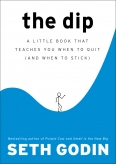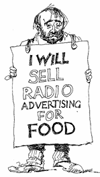Sales trainer Chris Lytel points to a Wall Street Journal interview with Ram Charan, a business professor turned consultant and author (What the Customer Wants You to Know).
“It has become very hard to differentiate yourself in the eyes of the customer, for business to business sales. So salespeople should not sell the product anymore. They should find out what the customer needs, which will be a combination of products and services and thought leadership.”
“In the old game, one person could do the selling. In the new game, you need a team from your company. The reason you need a team is the solution you’re going to create is going to come form different parts of your company. That means salespeople have to be good leaders, to lead their team, and also persuade the customer team. Because customers also buy in teams.”
Thought leadership. Interesting concept. Increasingly, our “network radio” sales reps are finding that their clients want more than 30 second spots. I suppose you could say they always wanted more than spots… they wanted the sales or mind-share those “spots” could bring.
These days, it’s rare that the prospect doesn’t bring up the subject of the web as part of their marketing strategy. Knowing a little something about blogging and podcasting has been very useful.


 That’s the prediction of Google Audio national director of sales Drew Hilles tells Inside Radio “Our main goal is to draw new advertisers to radio” and when they do that’ll put pressure on inventory and result in higher rates for all buyers. The onetime CBS Radio exec says “our goal is to raise rates” and return the sector to double-digit growth. He says one way they help preserve a station’s rate card integrity is by allowing buyers to pick markets — but not individual stations. And Hilles says “stations have control of the throttle of how much of the inventory they open up or not.” Hilles says Google is working to attract some of its existing 100,000 advertisers who have found radio too tough to buy. Hilles says what attracts them is the “more Googley way” they sell radio that affords buyers more accountability and trackability. Google says “a large amount” of the advertisers are new to radio. [
That’s the prediction of Google Audio national director of sales Drew Hilles tells Inside Radio “Our main goal is to draw new advertisers to radio” and when they do that’ll put pressure on inventory and result in higher rates for all buyers. The onetime CBS Radio exec says “our goal is to raise rates” and return the sector to double-digit growth. He says one way they help preserve a station’s rate card integrity is by allowing buyers to pick markets — but not individual stations. And Hilles says “stations have control of the throttle of how much of the inventory they open up or not.” Hilles says Google is working to attract some of its existing 100,000 advertisers who have found radio too tough to buy. Hilles says what attracts them is the “more Googley way” they sell radio that affords buyers more accountability and trackability. Google says “a large amount” of the advertisers are new to radio. [